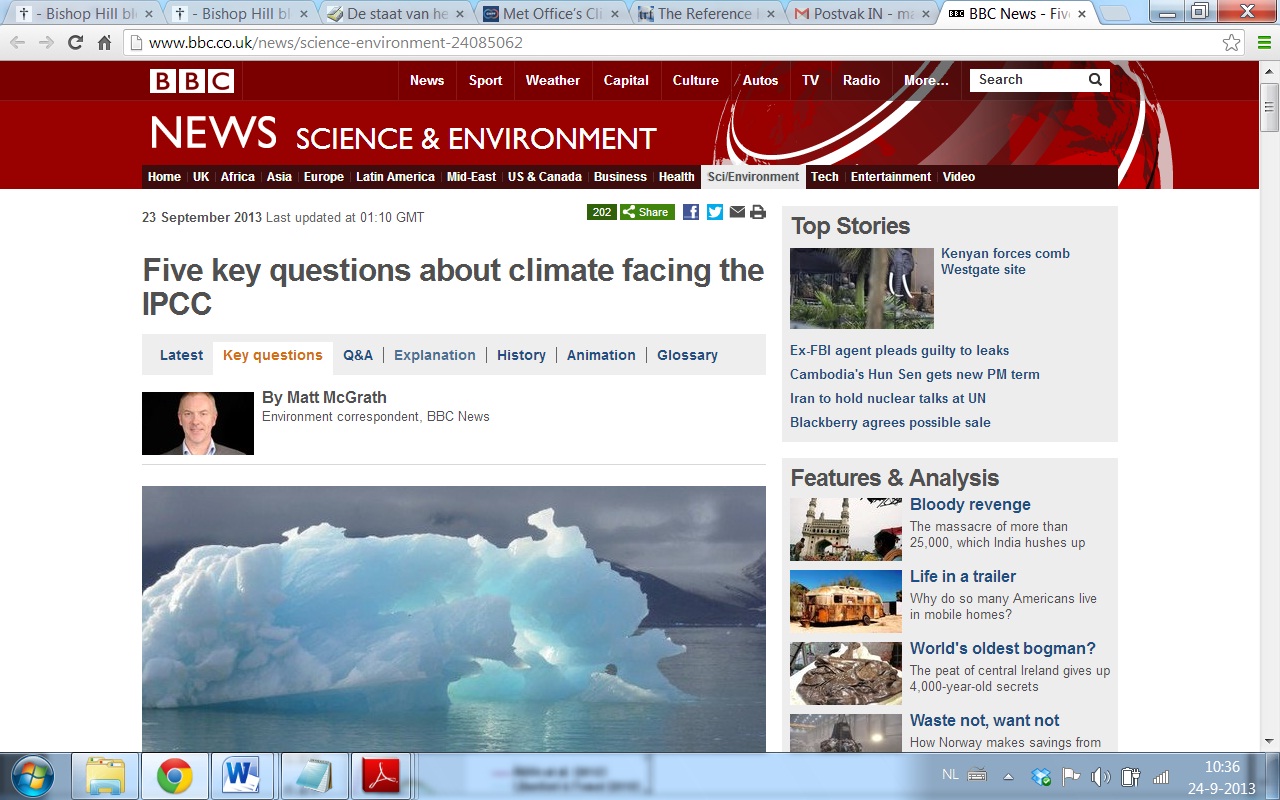I was interviewed last week in Amsterdam by Matt McGrath, one of the environmental correspondents of the BBC. The conversation was really pleasant. Today he has published an article on the BBC Science website. He is focusing on five key/critical questions for the IPCC. Actually in his article I only count four questions:
Hasn’t global warming stopped since 1998?
Am I going to get flooded?
And what about the Polar bears?
Does the IPCC have a future?
I am quoted fairly in the part about the slowdown saying:
Climate sceptics, however, argue that the pause is evidence that climate models used by the IPCC are too sensitive and exaggerate the effects of carbon dioxide.
“In the last year, we have seen several studies showing that climate sensitivity is actually much less than we thought for the last 30 years,” said Marcel Crok, a Dutch author who is sceptical of the IPCC process.
“These studies show that our real climate has a sensitivity of between 1.5C and 2.0C. But the models are much more sensitive, and warm up three degrees.”
Arbitrary
His questions look a bit arbitrary though. I don’t think polar bears will be on the agenda this week in Stockholm. There are much more urgent matters to deal with, like how to deal with the slowdown and the fact that models are running hot compared to the observations.
After the interview Matt asked me to send him my five critical questions. I post them below:
1) The increase in the global average temperature between 1900 and 1950 is almost indistinguishable from the warming between 1950 and 2010. However the increase in anthropogenic forcing was much higher in the most recent period than in the period of the so-called ‘early warming’. What is the explanation of the early warming?
2) There is evidence that there are still warm biases in the global average temperature series. Apart from the Urban Heat Island-effect there is now solid evidence that the trends in the minimum temperature are not a good indicator for climate change because they are related to disturbances in the nighttime boundary layer. The global trend in minimum temperature is twice as high as the trend in maximum temperatures. Do you agree that it’s better to use only the maximum temperature as a climate metric and do you accept that by doing that the increase in global temperature is actually between 0.1 and 0.2 degrees lower than the generally accepted 0.8 degrees of warming?
3) Models seriously overestimate the warming of the real climate in the past 25-30 years, not only globally (see here and here) but also in the tropical troposhere where a pronounced hotspot is expected see here. What is your explanation for this? A follow up question would be: why would we trust claims of the IPCC that it’s very likely that most of the warming since 1950 is due to anthropogenic greenhouse gases, since these claims are based on the same models?
4) Several recente papers (Aldrin et al, Ring et al, Lewis, Otto et al) show that based on the observed climate of the past one and a half century, climate sensitivity is considerably lower (between 1.5 and 2 degrees) than the best estimate of three degrees that has been generally accepted by the climate science community for over thirty years. The CMIP5 models, run for the upcoming AR5 report, have a climate sensitivity of 3 degrees on average. How do you explain this large difference between estimates for climate sensitivity based on models and observations?
5) My last question is adopted from a recent blog post by Roger Pielke jr: “A difficult question for the climate science community is, how is it that this broad community of researchers — full of bright and thoughtful people — allowed intolerant activists who make false claims to certainty to become the public face of the field?”



Volgens mij is dit zijn vijfde vraag (als eerste genoemd): The IPCC – weren’t they the ones who said the Himalayan glaciers would disappear by 2035? How can we trust what they say this time?
Imagine what would have happened had climate science and the IPCC gone unchallenged all these years?